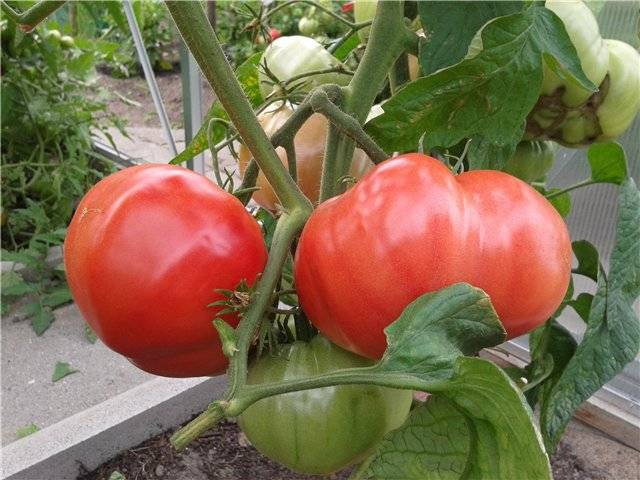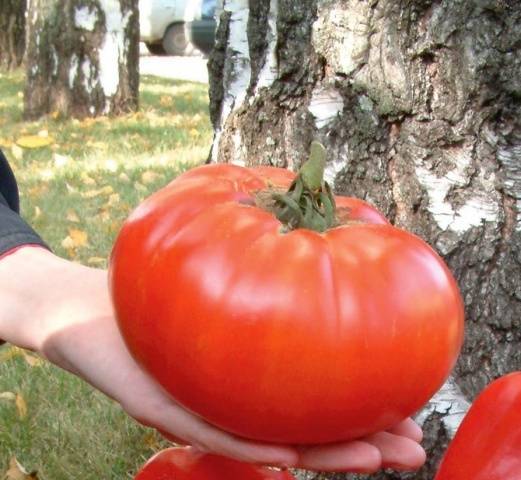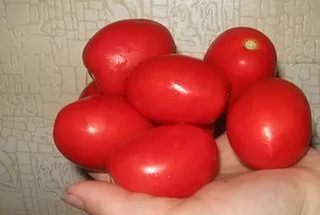Content
Tomato Russian size fully lives up to its name. It is a large variety, very fruitful, tasty and aromatic. It is used not only for home purposes, but also in large agricultural companies. This variety is cultivated on an industrial scale. The tomato bears fruit for a long time, and all the characteristics and description of the Russian size tomato variety have made it popular for more than 20 years.
Description
Tomato Russian size refers to a late-ripening species. The first harvest occurs 130-140 days after the first shoots. The variety is indeterminate, which means that there are no restrictions on its growth, it is recommended to pinch it. Additionally, the plant requires pinching, due to which 1-2 strong, strong stems are created.
In color and shape, the leaves do not differ from other varieties. After the appearance of 9 sheets, the first color begins to form in the bosom, which appears every 3-4 sheets. As the reviews show, the yield of the tomato Russian size is excellent, the photo confirms this:
Bushes bear fruit for a long time. Harvesting is best done in August, but it does not end there, and lasts until frost.
The described giant tomatoes include many positive qualities that not all varieties can boast of. They can be used for fresh consumption or for preparing various dishes.
Visually, the fruits are rounded, slightly flattened horizontally. The shape is slightly ribbed. Tomatoes will be pale green if not yet ripe, and when ripe, the fruits turn rich red. The characteristics of a tomato Russian size can be described in a few words - very large fruits, fleshy pulp, and the mass of each tomato is from 600 grams to 2 kg.
As the reviews show, the Russian size tomato is best consumed fresh, as a cut and for salads. In some cases, tomatoes can be used for winter harvesting, but they will need to be cut. The pulp differs from other varieties, it is very tender and juicy, excellent taste. The tomatoes are slightly sweet to taste.
According to lovers of this variety, if you use it in the form of slices for various preparations and dishes, then the shape does not disappear. It is good to use the crop for making pasta or juicing. In addition, the variety is good in combination with other crops, which makes it possible to make an assortment.
Planting and growing
Since the Russian size variety is a giant, you need to know some of the rules for its cultivation. Within a week after sowing, the first shoots appear, more often they arise together. After 1.5 weeks, 2 leaves appear on each plant, which must be dived.
After a month, the seedlings will need to be transplanted to a permanent place of growth. This variety is suitable exclusively for greenhouse cultivation. Due to the large size of the seedlings, they are rarely planted so that the tomatoes can develop normally, they are not infringed, and they receive the necessary amount of nutrients from the ground.
After planting in the ground, after a few days you need to start tying up the bushes and carry it out as you grow. In the lower part of the bushes, the leaves break off, this can be done before the first inflorescence, pinching is carried out. Shoots that appear on the sides make it possible to get tillering. It is often used by gardeners for tomato shaping.If the main task is to get small to medium-sized tomatoes, then you need to choose a couple of strong sprouts. For large tomatoes, leave 1 stem.
Depending on the height, it is necessary to pinch the upper part to limit growth. When growing, it is forbidden to often fertilize the soil, especially with organic types of feed, which have a lot of nitrogen. According to reviews, tomatoes Russian size love potash or phosphorus fertilizers. For this, fishmeal is used.
Care
Caring for tomatoes is very simple:
- It is necessary to water the bushes constantly, abundantly. This makes it possible for the root system to develop better. If watering is insufficient or frequent, then this leads to the formation of fruits on the sides, while they will not receive the required amount of nutrients during a period of decreasing temperature or drought. For one bush, it is enough to use a liter of water.
- Loosening should be carried out between rows and in rows approximately every 10 days. If the soil is heavy, then it is imperative to loosen it 2 weeks after planting.
- Hilling of the Russian size is carried out 10 days after planting the seedlings. Before the procedure, the ground is watered. The second time to huddle tomatoes is necessary after 3 weeks.
- Feeding is carried out 2-3 times during the entire growing period.
When leaving, it is important to properly form Russian-sized bushes.
Diseases and pests
According to reviews, the Russian size F1 tomato is a hybrid that is not afraid of standard diseases. Not scary for the variety:
- Tobacco mosaic.
- Cladosporium.
- Fusarium.
If the cultivation and care is carried out with violations, then late blight may appear. During the growing season, it is recommended to carry out preventive measures using special substances.
Among the possible pests, it is worth highlighting:
- Wireworm.
- Medvedka.
- Whitefly.
- Nematoda.
Often, with a lack of nutrients in the soil, Russian hybrid tomatoes begin to undergo various changes and attacks from diseases or pests. You can determine the lack of useful elements by their characteristic features:
- Lack of nitrogen can be determined by the color of the stem, leaves, tomatoes. The leaves on the bushes become small, the color changes from green to yellow, and the veins below acquire a red-blue tint. The tomatoes themselves will not be so large, their hardness will increase.
- Lack of phosphorus is determined by the sheets twisted inward.
- If there is little potassium, then the leaves curl.
- Lack of calcium provokes the appearance of yellow spots on young leaves, and on old ones, their size and color change. With a small amount of calcium, the upper part of the plant can rot, especially if there is high humidity.
- The lack of sulfur is characterized by a pale shade of leaves, and after a while they quickly and strongly turn yellow, in some cases turn red.
- Boric starvation of tomatoes leads to the appearance of black spots in the place of stem growth, the tomatoes themselves will have brown spots.
- Lack of molybdenum causes yellowness on the sheets, they curl upward, and after a while the plate is completely affected by chlorosis.
- Iron starvation causes the tomato to stop growing. Young leaves are exposed to chlorosis.
If you properly look after and make timely feeding, then the Russian size will only please. All inflorescences of the plant are of the simple type. Up to 3 very large tomatoes can appear on one cluster. People who use such a variety for personal purposes know all the subtleties that make it possible to get giant fruits.
After the appearance of the first tomato in the lower part of the brush, when the diameter of the fruit is about 5 cm, it will be necessary to pluck the inflorescences and small ovaries, leaving only 2-3 of the largest fruits on the brush. If you leave only one tomato per cluster, it can grow like a small melon.
Picking tomatoes
The assembly is not carried out immediately, initially it is necessary to remove only deformed, damaged tomatoes.
For the long-term preservation of the Russian size variety, they must be plucked not in a mature state, but when they become brown. Then you can send them for ripening. Tomatoes are removed until the temperature at night is less than +8 degrees. If the collection is carried out later, then storage will not work, and the fruits themselves begin to hurt.
The Russian size variety has an extended fruiting, which means that the collection is carried out from August until the first cold weather. With proper care, it will be possible to collect up to 8 kg of tomatoes from 1 sq. m.
Testimonials
Conclusion
The Russian size variety is a valuable tomato that requires some attention from the gardener during cultivation. Due to proper care, there will be a high yield, excellent taste and weight of each tomato.










